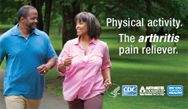Don't Let Arthritis Stand in Your Way. Manage Your Arthritis.
There are many ways you can take charge of your arthritis so you can live the life you want and keep doing the things you love.
Physical Activity
If living with arthritis is keeping you from doing the things you enjoy, regular, moderate physical activity can help you take charge and show arthritis who's boss.
How does physical activity help arthritis?
Studies have shown that physical activity helps reduce pain, tiredness, and stiffness from arthritis. Physical activity can also improve your mood, reduce stress, and increase energy levels.
Adults with arthritis that got regular physical activity felt better in as little as four – six weeks.
What is moderate physical activity?
Physical activity is considered moderate if you can easily have a conversation while doing it. Common types of moderate physical activity are walking, biking, and swimming, but you're not limited to these activities. If it gets your heart rate up, it counts:
- Dancing
- Water aerobics
- Yardwork, like raking or trimming shrubs
- Household chores, such as vacuuming
- Walking your dog
- Playing with your children or grandchildren
How much moderate physical activity should you get?
National guidelines recommend that adults get at least 150 minutes of moderate intensity activity a week, or 30 minutes per day, five days a week. If 30 minutes is too much, try breaking it up into three 10-minute sessions.
There's more!
Moderate physical activity isn't just good for arthritis, it can also help you lose weight and keep it off and manage other kinds of chronic conditions, including prediabetes, type 2 diabetes, and heart disease.
Get started!
Get moving and keep moving! Any physical activity is better than no physical activity. Start slowly and work your way up to longer periods of activity. The sooner you start, the sooner you'll feel better.
- Explore Trail and Recreation Opportunities in New York State Parks
- Universal Access in New York State Parks
- U.S. Department of Health and Human Services Move Your Way Campaign
Learn more
- Physical Activity. The Arthritis Pain Reliever.
- Physical Activity Guidelines for Americans, 2nd Edition
- Centers for Disease Control and Prevention Physical Activity for Arthritis
Self-management Education
Self-management education programs can help you gain the skills and confidence you need to manage the day-to-day symptoms of arthritis.
Attending a self-management program can help you:
- Manage pain and fatigue
- Improve your ability to set and meet goals
- Reduce frustration and worry about your health
- Improve your ability to talk with your doctor or health care provider
Watch your weight.
Maintaining a healthy weight can reduce the risk of knee osteoarthritis, or wear and tear on the joints, and delay the worsening of the disease. Weight loss programs that offer both exercise and information on eating a healthy diet are the most effective and result in significant improvements in pain and function.
Injury Prevention
Joint injury can lead to osteoarthritis, a condition caused by wear and tear on the joints. People who experience sports or occupational injuries or have job with repetitive motions, like repeated knee bending, have more osteoarthritis. To reduce your risk of developing osteoarthritis, avoid joint injury by wearing the correct safety equipment when on the job and while playing sports. Try to do a variety of physical activities to reduce repetitive stress on joints.
See Your Doctor
If you have symptoms of arthritis, see your doctor to begin the treatment and management that's right for you.
